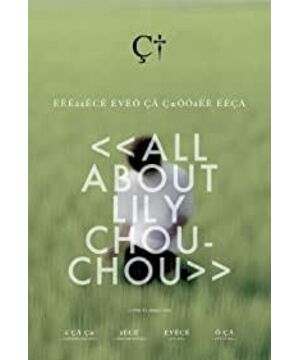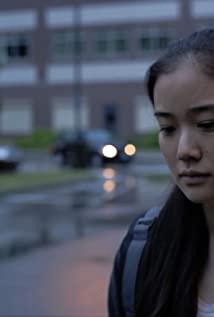"All About Lily Zhou" is a realistic film dedicated to brutal youth. The movie is full of exaggerated depression and blood, but the camera uses a lot of high-saturation colors and overexposure, so that the ritual and beauty of the details of the camera are like ironic cruel youth. Shunji Iwai, who is a former MV director, used beautiful lenses to construct a repressed and cruel youth. A large number of swaying shots, some of which were shot directly with a handheld camera, are rough and blurred, and the bulging and gorgeous light clusters create a hazy and distorted state, which reflects the real spiritual reality of today's youth in Japan. The music of Debussy, Chopin, and Takeshi Kobayashi has been applied to murder and violence. This is Shunji Iwai's unique deconstruction application in audiovisual language. The most cruel pictures are narrated in the most beautiful audiovisual language. irony. In the narrative structure, the film actually adopts a two-line narrative. On one side is the story of Hoshino and Hasumi in real life, and on the other side is the intersection of the two on the Lily Zhou website through subtitles. The two-line mixed narrative makes the characters more full, and truly shows the psychological state of the current Japanese youth from multiple angles and viewpoints. The multi-faceted use of narrative structure and audition features constructs the unique quality of "All About Lily Zhou" that is different from the usual youth films, which is also a breakthrough by Iwai Shunji compared with the past.
"All About Lily Chow" is a bit confusing on the setting of Lily Chow and "Ether," but both are important details for established film characters. Lily Zhou essentially symbolizes the ups and downs and uncertainty of growing up, her birthday coincides with the death anniversary of the great Beatle John Lennon, and her name is the love story of Debussy's wife LILY and second daughter CHOU combine. When Shunji Iwai constructed the name "Lily Zhou", he endowed her with the same bumpy fate as John Lennon and the same tangled heart as Debussy. Therefore, Lily Zhou is a representative image who longs for fatherly love, but is autistic and always lives in her heart. Her experience is the embodiment of the ups and downs of growth, so it will attract the same people like Hasumi and Hoshino. And the result of this painful youth and bumpy growth is "Ether". The ether is the space of nothingness, like escape, let death end life, that is, release from the bitter youth in life. The setting of Tai and Lily Zhou is Shunji Iwai's unique understanding of youth and resonates with the characters. Hoshino and Hasumi are madly obsessed with Lily Zhou and Ether, and that's why.
On the surface, "All About Lily Zhou" seems to be just a description of a cruel and different kind of youth, but in essence it expresses the uncertainty of youth and the paradox in growth. Hoshino went from a good student to a villain who did all kinds of evil, and Hasumi went from an introverted student to a downright murderer. Both of them are extremely delicate and sensitive in their inner feelings on the road of growth, and they are extremely vulnerable to changes by others and their own confusion and fear of life. They are just like each of us. While looking forward to the beauty of growing up, they can't help but fear and suppress growth. But when carrying out this paradox, they stubbornly want to keep their inner independent thoughts. The sensitive and fragile heart can't bear this kind of paradox at all, thus causing the tragedy of their youth. Not only that, but the subversion of family relationships and the traditional status of patriarchy is also the main cause of the tragedy of the two protagonists. Hasumi is a reorganized family, and his stepfather lets him ignore him, while Hoshino's father simply doesn't show up at all. The leader of the family relationship becomes the mother, which leads to a lack of fatherly love. The absence of paternal love is undoubtedly fatal in adolescence. When boys reach puberty, they are often alienated and even disgusted with their fathers, and this alienation and disgust is mixed with the disappointment and misery of not being able to love their fathers. Boys will blindly seek remedies for the lack of father's love, including smoking, drinking, violence, sexual indulgence, etc., longing for father's love, which is the boy's deepest psychological need. Only with his father can a boy build a complete and normal life. worldview and outlook on life. The tragedy of Hoshino and Hasumi is not only due to their character, but also a doomed tragedy, and it is also caused by an abnormal family relationship that lacks patriarchy. The confusion of youth and the abnormality of family relations are only appearances. The deeper reason for changing the protagonist is actually an eternal topic, that is, the confusion of life and the fear of death. This is also the same in "The Undertaker". The Japanese always have an inexplicable sense of reverence for life and death, and they regard dying for the group as an act worthy of respect. But such traditional thinking has caused great confusion among young people. They don't know why they exist in this world, they don't know why they want to live, they don't know why they have to be bound by the purpose of death. Hoshino was close to death in Okinawa, and being too close to death made him fear and puzzled about life. Together with the previous entanglement, it completely changed his character. The traditional Japanese view of life and death affects every teenager and becomes an inevitable stumbling block on the road to growth.
Like "Swallowtail Butterfly", Shunji Iwai's "All About Lily Zhou" also infuses an anti-industrial point of view. Different from "Swallowtail Butterfly", which simply and neatly shows the cold steel and concrete of the industrial age, "Lily Zhou" shows the beautiful rural fields from beginning to end, and is committed to showing the most beautiful rural life, so as to achieve the anti-industrial age. Purpose. In addition, it also shows the true feeling of being in a busy city but feeling infinite loneliness, rather than the freedom and enrichment of listening to music in the field. Therefore, "All About Lily Zhou" not only has a profound theme, but also has a contemporary and distinct point of view.
The drama master Lai Shengchuan once said that the script is the process of the characters' "illness" meeting the "medicine". This canon is universal. But that's not the case in "Lily Week." Until the end, the character's illness did not encounter medicine. Maybe this is youth. Regardless of right or wrong, regardless of the process, there are not so many dogmas on the road of youth. The pain and hesitation of youth have been bloodily presented in front of us. As for whether the character has encountered medicine, let him go with the wind.
View more about All About Lily Chou-Chou reviews










